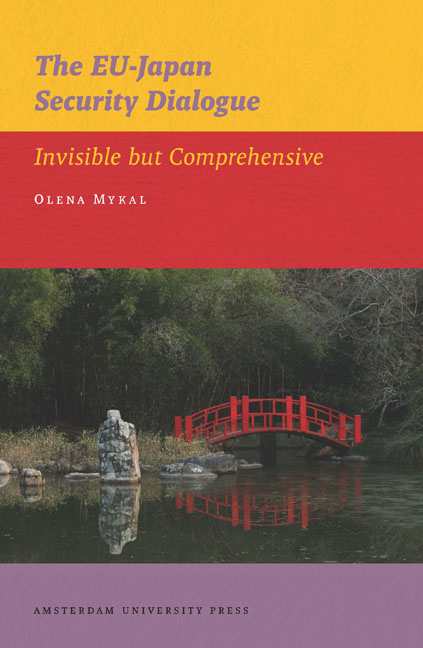Book contents
- Frontmatter
- Dedication
- Contents
- Abbreviations
- Acknowledgements
- Preface
- Introduction
- PART ONE DEVELOPING CONCEPTIONS OF SECURITY AND JOINT AGENDA OF THE EU-JAPAN SECURITY DIALOGUE
- PART TWO COMMON INTERESTS IN THE EU-JAPAN SECURITY DIALOGUE: ANALYSIS OF JOINT ACTIVITIES
- Conclusion
- About the Author
- Notes
- Bibliography
- Index
- Publications Series
5 - Towards a Secure Future: The EU-Japan Security Dialogue in Science and Technology and Energy
Published online by Cambridge University Press: 22 January 2021
- Frontmatter
- Dedication
- Contents
- Abbreviations
- Acknowledgements
- Preface
- Introduction
- PART ONE DEVELOPING CONCEPTIONS OF SECURITY AND JOINT AGENDA OF THE EU-JAPAN SECURITY DIALOGUE
- PART TWO COMMON INTERESTS IN THE EU-JAPAN SECURITY DIALOGUE: ANALYSIS OF JOINT ACTIVITIES
- Conclusion
- About the Author
- Notes
- Bibliography
- Index
- Publications Series
Summary
Part one demonstrated that, since the 1980s, science and technology as well as energy have frequently appeared on the EU-Japan agenda. Moreover, on the basis of our analysis of the European and Japanese security conceptualisations, we could argue that these areas, especially energy, have been incorporated into the security agenda. Japan, particularly, views science and technology as central to national power. Richard J. Samuels (1994) labels this entrenched Japanese mode of thinking and behaviour as ‘techno-nationalism’. Jean-Pierre Lehmann (1992: 132) also emphasises that the strategies of a number of European corporations with regard to Japan have increasingly been influenced by the recognition of its role as a technological powerhouse. In general, Europe thought that ‘Japanese technological know-how was on a par with anything from the industrialised world’ (cited in Ogura 2000: 171). This opinion continued to blossom over time. Some in Japan, however, believe that technology is actually a strong military deterrent (Wan 2001: 196).
We should also especially note that energy had been on the agenda since 1973, after the first oil crisis. However, energy is not just crude oil or gas, but an area of research. For example, Europe and Japan have been engaged in research on thermonuclear fusion since the beginning, which involves both energy and research activities. Thus, we place energy in the broader category of science and technology development issues.
This chapter will focus on an examination of concrete activities in the area of science and technology within the EU-Japan security dialogue since its establishment in the 1980s. It argues that the security dialogue in science and technology has a comprehensive agenda and, moreover, that it tends to enlarge and deepen, especially at the multilateral level. To demonstrate this, this chapter is organised into two parts.
The first part will discuss cooperation between Japan and Europe in science and technology since the launch of the dialogue through to the late 1990s. This will be covered in three sections: the first will examine the signing of the Agreement on Nuclear Safeguards Research and Development and its implications for the security dialogue. The second will review the engagement of both sides in multilateral institutions and projects. The final section will study the establishment of the EUJapan Forum, the initiation of academic exchange programs, and Japanese membership in the European Council for Nuclear Research (CERN) project.
- Type
- Chapter
- Information
- The EU-Japan Security DialogueInvisible but Comprehensive, pp. 143 - 156Publisher: Amsterdam University PressPrint publication year: 2012



